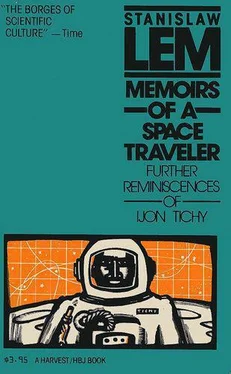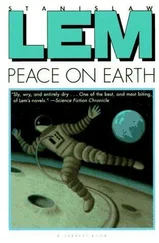On day 1,006, having left the local system of the Nereid Nebula, I noticed a spot on the screen and tried rubbing it off with a chamois cloth. There was nothing else to do, so I spent four hours rubbing before I realized that the spot was a planet and rapidly growing larger. Circling this heavenly body, I was not a little surprised to find that its vast continents were covered with regular patterns and geometric configurations. I landed with due caution in the middle of an open desert. It was covered with small disks, perhaps half a meter in diameter; hard and shiny, as if turned on a lathe, they ran in long rows in various directions, forming the designs I had noticed from a high altitude. After making a few tests, I went cruising just above the ground seeking an answer to the riddle of the disks, which intrigued me enormously. During a two-hour flight I discovered, one after the other, three immense and beautiful cities; I touched down in a square in one of them. But the city was completely deserted; houses, towers, squares, everything was dead; no sign of life anywhere, or any trace of violence or natural disaster. More amazed and bewildered than ever, I flew on. Around noon I found myself above a vast plateau. Catching sight of a shiny building near which there was some sort of movement, I immediately landed. A palace rose from the rocky plain, sparkling as though cut from a single diamond. A wide marble staircase led up to its gilded portal. At the foot of the staircase several unfamiliar beings were milling about. I looked at them close up. If my eyes did not deceive me, they were alive and, moreover, resembled humans so much (especially from a distance) that I dubbed them “hominiformicans.” I was prepared with this name because I had spent time during my voyage thinking up nomenclature, in order to have terms handy for such occasions. “Hominiformicans” fit the bill, for these beings walked upon two legs and had hands, heads, eyes, ears, and lips. True, the lips were in the middle of the forehead, the ears under the chin (a pair on each side), and the eyes — ten in all — were arranged like rosary beads across their cheeks. But to a traveler like me, who has encountered the most bizarre creatures in the course of his expeditions, they were the spit and image of humans.
I approached them, keeping a safe distance, and asked what they were doing. They made no reply, but continued peering into the diamond mirrors that rose from the lowest step of the staircase. I tried to interrupt them once, twice, three times, but seeing that this had not the slightest effect, in my impatience I shook one vigorously by the shoulder. Then they all turned in my direction and seemed to notice me for the first time. After regarding me and my rocket with some astonishment, they asked me several questions, to which I willingly replied. But because they kept breaking off the conversation to gaze into the diamond mirrors, I was afraid I would not be able to question them properly. Finally, however, I managed to persuade one to satisfy my curiosity. This Phool (for, as he told me, they are called Phools) sat down with me on a rock not far from the stairs. My interlocutor fortunately possessed considerable intelligence, which showed in the gleam of the ten eyes on his cheeks. He threw his ears over his shoulders and described the history of the Phools, as follows:
“Alien voyager! You must know that we are a people with a long and splendid past. The population of this planet has been divided from time immemorial into Spiritors, Eminents, and Drudgelings. The Spiritors were absorbed in the contemplation of the nature of the Great Phoo, who in a deliberate creative act brought the Phools into being, settled them on this globe, and in His inscrutable mercy surrounded it with stars to illumine the night and also fashioned the Solar Fire to light our days and send us beneficent warmth. The Eminents levied taxes, interpreted the meaning of state laws, and supervised the factories, in which the Drudgelings modestly toiled. Thus everyone worked together for the public good. We dwelt in peace and harmony; our civilization reached great heights. Through the ages inventors built machines that simplified work, and where in ancient times a hundred Drudgelings had bent their sweating backs, centuries later a few stood by a machine. Our scientists improved the machines, and the people rejoiced at this, but subsequent events showed how cruelly premature was that rejoicing. A certain learned constructor built the New Machines, devices so excellent that they could work quite independently, without supervision. And that was the beginning of the catastrophe. When the New Machines appeared in the factories, hordes of Drudgelings lost their jobs; and, receiving no salary, they faced starvation…”
“Excuse me, Phool,” I asked, “but what became of the profits the factories made?”
“The profits,” he replied, “went to the rightful owners, of course. Now, then, as I was saying, the threat of annihilation hung…”
“But what are you saying, worthy Phool!” I cried. “All that had to be done was to make the factories common property, and the New Machines would have become a blessing to you!”
The minute I said this the Phool trembled, blinked his ten eyes nervously, and cupped his ears to ascertain whether any of his companions milling about the stairs had overheard my remark.
“By the Ten Noses of the Phoo, I implore you, O stranger, do not utter such vile heresy, which attacks the very foundation of our freedom! Our supreme law, the principle of Civic Initiative, states that no one can be compelled, constrained, or even coaxed to do what he does not wish. Who, then, would dare expropriate the Eminents’ factories, it being their will to enjoy possession of same? That would be the most horrible violation of liberty imaginable. Now, then, to continue, the New Machines produced an abundance of extremely cheap goods and excellent food, but the Drudgelings bought nothing, for they had not the wherewithal…”
“But, my dear Phool!” I cried. “Surely you do not claim that the Drudgelings did this voluntarily? Where was your liberty, your civic freedom?!”
“Ah, worthy stranger,” sighed the Phool, “the laws were still observed, but they say only that the citizen is free to do whatever he wants with his property and money; they do not say where he is to obtain them. No one oppressed the Drudgelings, no one forced them to do anything; they were completely free and could do what they pleased, yet instead of rejoicing at such freedom they died off like flies… The situation worsened; in the factory warehouses, mountains of unpurchased goods rose skyward, while swarms of wraithlike, emaciated Drudgelings roamed the streets. The Plenum Moronicum, the venerable assembly of Spiritors and Eminents that governed the state, conferred all year round on ways to remedy the evil. Its members gave long speeches and frantically sought a way out of the predicament, but to no avail. At the very beginning of the deliberations, one member of the Plenum, the author of a famous work on the nature of Phoolian freedoms, demanded that the constructor of the New Machines be stripped of his golden laurel wreath and that, on the contrary, his ten eyes be plucked out. This was opposed by the Spiritors, who begged mercy for the inventor in the name of the Great Phoo. The Plenum Moronicum spent four months determining whether or not the constructor had violated the laws of the realm by inventing the New Machines. The assembly split into two camps. The dispute was, finally, ended by a fire in the archives that destroyed the minutes of the proceedings; since none of the august members of the Plenum could recall what position they had taken on the issue, the whole matter was dropped. It was then proposed that the Eminents, who owned the factories, be requested to cease building the New Machines; the Plenum appointed a committee for this purpose, but the committee’s entreaties had not the slightest effect. The Eminents declared that it was their fondest wish to continue to produce in this way, for the New Machines worked more cheaply and more swiftly than did the Drudgelings. The Plenum Moronicum resumed deliberations. A law was drawn up stipulating that the factory owners give a fixed percentage of their profits to the Drudgelings, but that proposal fell through, too, for, as Archspiritor Nolab rightly pointed out, such handouts would have corrupted and degraded the souls of the latter. Meanwhile, the mountains of manufactured goods kept rising, until finally they began to spill out over the walls of the factories, whereupon mobs of starving Drudgelings rushed up with threatening cries. In vain did the Spiritors attempt to explain to them, with the greatest kindness, that they were defying sovereign laws and daring to oppose the Phoo’s inscrutable decrees; that they should endure their lot meekly, for through mortification of the flesh the soul is elevated and gains the certainty of heavenly reward. The Drudgelings, however, turned a deaf ear to this wisdom, and armed guards were needed to curb their seditious activity.
Читать дальше












